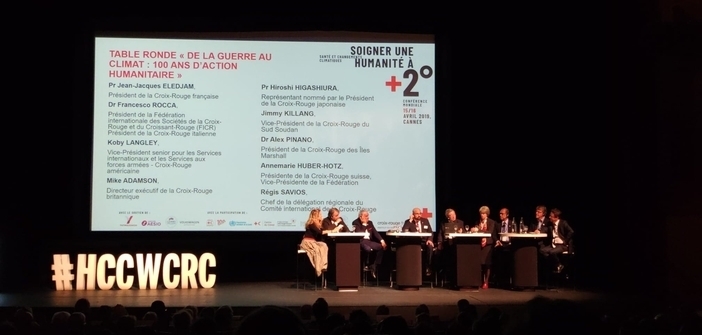On the occasion of the centenary of the founding of the International Red Cross and Red Crescent Federation, a world conference is being held this Monday and Tuesday at the Théâtre de la Croisette in Cannes.
Nearly 400 international experts and field actors are gathered, as well as political figures such as Laurent Fabius, President of the Constitutional Council, and François de Rugy, Minister of Ecological and Inclusive Transition who spoke via video message.
“Treating a humanity at +2 degrees” is a title that might send a chill down your spine. Yet, we must be realistic, our world is now exposed to drastic climate changes that will have consequences on our lifestyles. Beyond these considerations, this humanitarian conference aimed to present the latest scientific research related to numerous topics, from a climate state of affairs to the management of public health in situations of crises or disasters.
The IFRC was created on May 5, 1919, on the initiative of the American, British, Italian, Japanese, and French Red Cross societies. A month prior, from April 1 to 11, 1919, these national societies met at a medical conference in Cannes to propose better coordination of actions and resource sharing of the Red Cross “Committees”: the history of the International Federation of Red Cross and Red Crescent Societies was set in motion. It seems fitting therefore to celebrate this centenary where it all began, in the very heart of the city of cinema.
On Monday morning, several personalities took turns to discuss the creation of the IFRC and to remind us of the planetary challenges we must face. David Lisnard, the mayor of Cannes, stressed the importance of developing a genuine local environmental ethic. The keywords of prevention and adaptation were mentioned most frequently throughout the speeches. It must be kept in mind that an additional 250,000 deaths per year are expected due to climate upheavals. The highly publicized 2018 IPCC report has already stated a global climate warming of 1 degree since the pre-industrial era. With this conference, it is understood that we are no longer trying to figure out how to avoid climate change, but rather how to manage it as best as possible.
In the afternoon, various themes were proposed to participants including one on reducing risks related to disasters. Different researchers explained the data collected in the field and shared the great resilience capacity of the populations. This term refers to the adaptation demonstrated by people in extreme health and life situations. Inventiveness, mutual aid, and coordination are the watchwords. Because the Red Cross and other organizations cannot do everything. Some affected areas are sometimes out of reach, and civilians find themselves involuntarily excluded from international aid plans.
Facing the greatest challenge of the 21st century, humanitarian personnel strives to modernize, combining compassion with more effective use of new technologies and scientific research. In this perspective, data retrieved from devastated regions or in severe epidemic situations become very valuable. They allow researchers and engineers to imagine risk prevention solutions and avoid the worst.
These two days of discussions and exchanges will not save humanity, but they demonstrate the determination of human beings not to let themselves fall.
Each year, the Red Cross helps several million people across the planet. In the near future, nearly 3.5 billion individuals will find themselves in areas at risk for their health and life.


